The Book of Kings is a book in the Hebrew Bible, found as two books in the Old Testament of the Christian Bible. It concludes the Deuteronomistic history, a history of ancient Israel also including the books of Joshua, Judges, and Samuel.
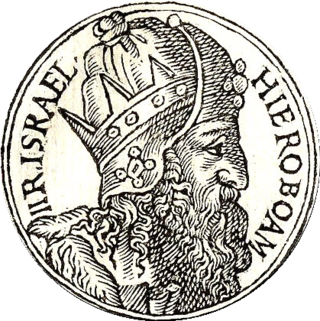
Jeroboam II, also referred to as Jeroboam son of Jehoash, was the successor of Jehoash and the thirteenth king of the ancient Kingdom of Israel, over which he ruled for forty-one years in the eighth century BC. His reign was contemporary with those of Amaziah and Uzziah, kings of Judah. Jeroboam is the fourth king of the House of Jehu and the longest-reigning king of the kingdom of Israel in Samaria. He is described as a military commander who fought Syria.
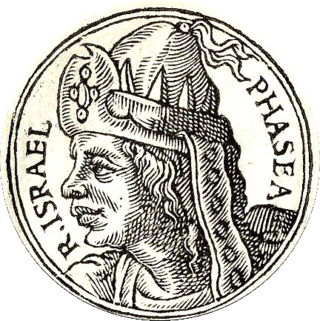
Pekah was the eighteenth and penultimate king of Israel. He was a captain in the army of king Pekahiah of Israel, whom he killed to become king. Pekah was the son of Remaliah.

Pekahiah was the seventeenth and antepenultimate king of Israel and the son of Menahem, whom he succeeded, and the second and last king of Israel from the House of Gadi. He ruled from the capital of Samaria.
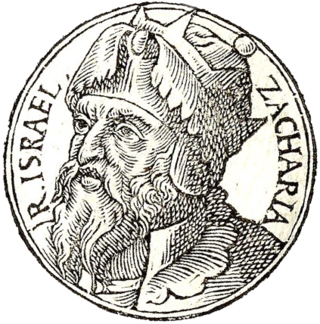
Zechariah was the fourteenth king of the northern Israelite Kingdom of Israel, and son of Jeroboam II.
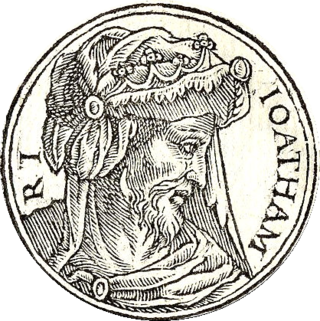
Jotham or Yotam was the eleventh king of Judah, and son of Uzziah and Jerusha, daughter of Zadok. Jotham was 25 years old when he began his reign, and he reigned for 16 years. Edwin R. Thiele concluded that his reign commenced as a coregency with his father, which lasted for 11 years. Because his father Uzziah was afflicted with tzaraath after he went into the Temple to burn incense, Jotham became governor of the palace and the land at that time, i.e. coregent, while his father lived in a separate house as a leper.
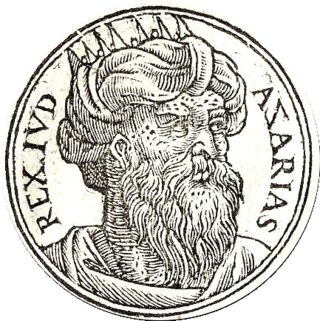
Uzziah, also known as Azariah, was the tenth king of the ancient Kingdom of Judah, and one of Amaziah's sons. Uzziah was 16 when he became king of Judah and reigned for 52 years. The first 24 years of his reign were as a co-regent with his father, Amaziah.
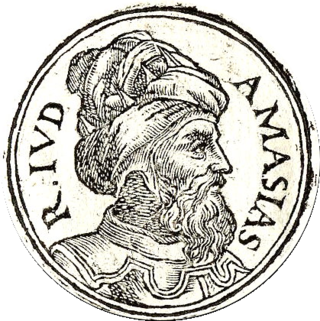
Amaziah of Judah, was the ninth king of Judah and the son and successor of Joash. His mother was Jehoaddan and his son was Uzziah. He took the throne at the age of 25, after the assassination of his father, and reigned for 29 years, 24 years of which were with the co-regency of his son. The second Book of Kings and the second Book of Chronicles in the Hebrew Bible consider him a righteous king, but with some hesitation. He is praised for killing the assassins of his father only and sparing their children, as dictated by the Mosaic Law.

Shallum of Israel, was the fifteenth king of the ancient Kingdom of Israel, and the son of Jabesh, who reigned for only one month in 752 BCE.
The House of Gadi was a dynasty of kings of the Northern Kingdom of Israel. The dynasty is also called the House of Menahem, after its founder. The dynasty lasted for only twelve years and ruled from Israel's then-capital of Samaria. The dynasty is so named because Menahem was the son of Gadi.
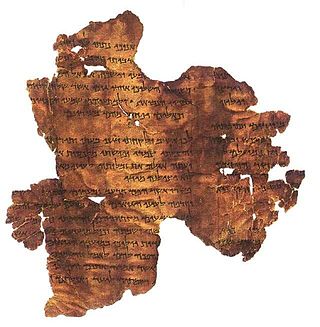
Hosea 1 is the first chapter of the Book of Hosea in the Hebrew Bible or the Old Testament of the Christian Bible. This book contains the prophecies attributed to the prophet Hosea, son of Beeri, and this chapter especially sets forth the spiritual whoredom of Israel by symbolical acts. It is a part of the Book of the Twelve Minor Prophets.

2 Kings 16 is the sixteenth chapter of the second part of the Books of Kings in the Hebrew Bible or the Second Book of Kings in the Old Testament of the Christian Bible. The book is a compilation of various annals recording the acts of the kings of Israel and Judah by a compiler in the seventh century BCE with a supplement added in the sixth century BCE. This chapter records the events during the reign of Ahaz, the king of Judah.

2 Kings 13 is the thirteenth chapter of the second part of the Books of Kings in the Hebrew Bible or the Second Book of Kings in the Old Testament of the Christian Bible. The book is a compilation of various annals recording the acts of the kings of Israel and Judah by a Deuteronomic compiler in the seventh century BCE, with a supplement added in the sixth century BCE. This chapter records the reigns of Jehu's son, Jehoahaz, and Jehu's grandson, Jehoash, in the kingdom of Israel during the reign of Jehoash, the king of Judah, as well as the events around the death of Elisha. The narrative is a part of a major section 2 Kings 9:1–15:12 covering the period of Jehu's dynasty.

2 Kings 14 is the fourteenth chapter of the second part of the Books of Kings in the Hebrew Bible or the Second Book of Kings in the Old Testament of the Christian Bible. The book is a compilation of various annals recording the acts of the kings of Israel and Judah by a Deuteronomic compiler in the seventh century BCE, with a supplement added in the sixth century BCE. This chapter records the events during the reigns of Amaziah the son of Joash, king of Judah, as well as of Joash, and his son, Jeroboam (II) in the kingdom of Israel. The narrative is a part of a major section 2 Kings 9:1–15:12 covering the period of Jehu's dynasty.

2 Kings 17 is the seventeenth chapter of the second part of the Books of Kings in the Hebrew Bible or the Second Book of Kings in the Old Testament of the Christian Bible. The book is a compilation of various annals recording the acts of the kings of Israel and Judah by a Deuteronomic compiler in the seventh century BCE, with a supplement added in the sixth century BCE. This chapter records the events during the reigns of Hoshea the last king of Israel, the capture of Samaria and the deportation of the northern kingdom population by the Assyrians.

2 Kings 12 is the twelfth chapter of the second part of the Books of Kings in the Hebrew Bible or the Second Book of Kings in the Old Testament of the Christian Bible. The book is a compilation of various annals recording the acts of the kings of Israel and Judah by a Deuteronomic compiler in the seventh century BCE, with a supplement added in the sixth century BCE. This chapter records the reign of Joash as the king of Judah.

2 Chronicles 16 is the sixteenth chapter of the Second Book of Chronicles the Old Testament in the Christian Bible or of the second part of the Books of Chronicles in the Hebrew Bible. The book is compiled from older sources by an unknown person or group, designated by modern scholars as "the Chronicler", and had the final shape established in late fifth or fourth century BCE. This chapter belongs to the section focusing on the kingdom of Judah until its destruction by the Babylonians under Nebuchadnezzar and the beginning of restoration under Cyrus the Great of Persia. The focus of this chapter is the reign of Asa, king of Judah.

2 Chronicles 26 is the twenty-sixth chapter of the Second Book of Chronicles the Old Testament in the Christian Bible or of the second part of the Books of Chronicles in the Hebrew Bible. The book is compiled from older sources by an unknown person or group, designated by modern scholars as "the Chronicler", and had the final shape established in late fifth or fourth century BCE. This chapter belongs to the section focusing on the kingdom of Judah until its destruction by the Babylonians under Nebuchadnezzar and the beginning of restoration under Cyrus the Great of Persia. The focus of this chapter is the reign of Uzziah, king of Judah.

2 Chronicles 27 is the twenty-seventh chapter of the Second Book of Chronicles the Old Testament in the Christian Bible or of the second part of the Books of Chronicles in the Hebrew Bible. The book is compiled from older sources by an unknown person or group, designated by modern scholars as "the Chronicler", and had the final shape established in late fifth or fourth century BCE. This chapter belongs to the section focusing on the kingdom of Judah until its destruction by the Babylonians under Nebuchadnezzar and the beginning of restoration under Cyrus the Great of Persia. The focus of this chapter is the reign of Jotham, king of Judah.













